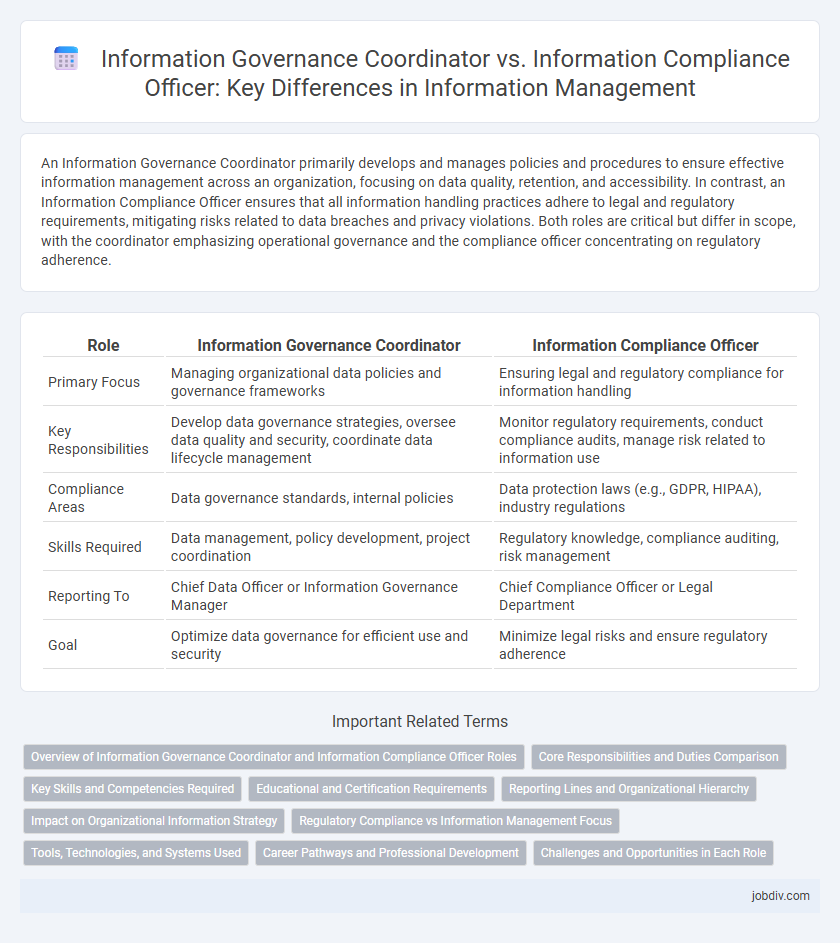An Information Governance Coordinator primarily develops and manages policies and procedures to ensure effective information management across an organization, focusing on data quality, retention, and accessibility. In contrast, an Information Compliance Officer ensures that all information handling practices adhere to legal and regulatory requirements, mitigating risks related to data breaches and privacy violations. Both roles are critical but differ in scope, with the coordinator emphasizing operational governance and the compliance officer concentrating on regulatory adherence.
Table of Comparison
| Role | Information Governance Coordinator | Information Compliance Officer |
|---|---|---|
| Primary Focus | Managing organizational data policies and governance frameworks | Ensuring legal and regulatory compliance for information handling |
| Key Responsibilities | Develop data governance strategies, oversee data quality and security, coordinate data lifecycle management | Monitor regulatory requirements, conduct compliance audits, manage risk related to information use |
| Compliance Areas | Data governance standards, internal policies | Data protection laws (e.g., GDPR, HIPAA), industry regulations |
| Skills Required | Data management, policy development, project coordination | Regulatory knowledge, compliance auditing, risk management |
| Reporting To | Chief Data Officer or Information Governance Manager | Chief Compliance Officer or Legal Department |
| Goal | Optimize data governance for efficient use and security | Minimize legal risks and ensure regulatory adherence |
Overview of Information Governance Coordinator and Information Compliance Officer Roles
An Information Governance Coordinator manages the lifecycle of organizational data, ensuring policies and standards support data quality, security, and accessibility across departments. An Information Compliance Officer focuses on adherence to legal and regulatory requirements related to data protection, privacy laws, and industry-specific compliance standards. Both roles collaborate to safeguard information assets, yet the coordinator emphasizes operational governance while the compliance officer prioritizes regulatory conformity.
Core Responsibilities and Duties Comparison
An Information Governance Coordinator primarily oversees the development and implementation of policies and procedures to manage organizational data effectively, ensuring data integrity and accessibility. In contrast, an Information Compliance Officer focuses on monitoring adherence to legal and regulatory requirements related to information security and privacy, conducting audits and risk assessments. Both roles collaborate to safeguard organizational information, but the Coordinator emphasizes strategic data management while the Compliance Officer targets regulatory compliance enforcement.
Key Skills and Competencies Required
Information Governance Coordinators require strong skills in data management, policy development, and cross-departmental collaboration to ensure organizational information is effectively controlled and utilized. Information Compliance Officers focus on regulatory knowledge, risk assessment, and auditing capabilities to maintain adherence to data protection laws and internal compliance standards. Both roles demand proficiency in information security, analytical problem-solving, and communication to align organizational practices with legal and governance frameworks.
Educational and Certification Requirements
An Information Governance Coordinator typically holds a bachelor's degree in information management, library science, or a related field, with certifications such as Certified Information Governance Professional (IGP) enhancing their qualifications. An Information Compliance Officer often requires a stronger legal or compliance background, holding degrees in law, business administration, or information security, complemented by certifications like Certified Information Privacy Professional (CIPP) or Certified Compliance and Ethics Professional (CCEP). Both roles benefit from continuous education in data protection regulations and information management best practices to ensure effective governance and compliance.
Reporting Lines and Organizational Hierarchy
An Information Governance Coordinator typically reports to the Chief Information Officer or Data Governance Manager, focusing on implementing policies across departments. The Information Compliance Officer usually reports directly to the Legal or Compliance Director, ensuring adherence to regulatory standards and managing audits. Organizational hierarchy places the Coordinator within operational teams, while the Compliance Officer often holds a more centralized role in corporate governance.
Impact on Organizational Information Strategy
The Information Governance Coordinator shapes organizational information strategy by developing policies that ensure data accuracy, security, and accessibility, directly influencing decision-making and operational efficiency. The Information Compliance Officer enforces regulatory requirements, minimizing legal risks and aligning data practices with industry standards to maintain organizational integrity. Together, their roles optimize information management frameworks, enhancing data-driven strategy execution and compliance resilience.
Regulatory Compliance vs Information Management Focus
Information Governance Coordinators prioritize establishing frameworks that ensure data quality, security, and accessibility aligned with organizational policies and standards. Information Compliance Officers concentrate on adhering to legal and regulatory requirements, mitigating risks associated with data breaches, and ensuring compliance with laws such as GDPR, HIPAA, or industry-specific regulations. Both roles are essential for maintaining robust information governance, with Coordinators emphasizing data management strategies and Compliance Officers focusing on regulatory adherence and risk mitigation.
Tools, Technologies, and Systems Used
Information Governance Coordinators utilize integrated data management platforms, compliance monitoring software, and risk assessment tools to ensure data quality and security across the organization. Information Compliance Officers focus on regulatory compliance systems, audit management software, and document control technologies designed to verify adherence to legal and industry standards. Both roles increasingly rely on AI-driven analytics and automated reporting tools to enhance transparency and accountability in information handling.
Career Pathways and Professional Development
Information Governance Coordinators typically advance through roles emphasizing data management, risk assessment, and policy implementation, often pursuing certifications such as Certified Information Governance Professional (CIGP) to enhance career prospects. Information Compliance Officers focus on regulatory adherence, audit processes, and legal standards, with career growth supported by qualifications like Certified Information Privacy Professional (CIPP) or Certified Information Systems Auditor (CISA). Both career pathways benefit from ongoing professional development in evolving data protection laws, cybersecurity trends, and organizational governance frameworks to maintain relevance and effectiveness.
Challenges and Opportunities in Each Role
Information Governance Coordinators face challenges in aligning organizational data policies with evolving regulatory requirements, requiring strategic oversight to ensure consistent data quality and accessibility. Information Compliance Officers encounter opportunities in leveraging compliance frameworks to mitigate legal risks and enhance data security protocols across departments. Both roles demand proactive adaptation to technological advancements and regulatory changes, fostering improved data management and protection strategies.
Information Governance Coordinator vs Information Compliance Officer Infographic

 jobdiv.com
jobdiv.com